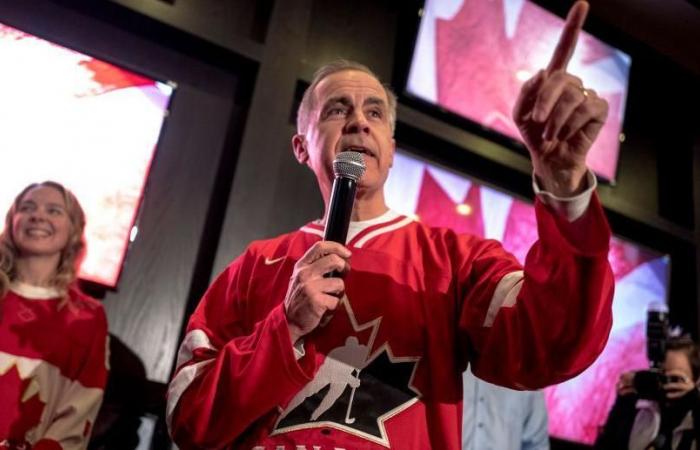The Liberal party led by Prime minister Mark Carney won this Monday in the federal elections held in Canada, elections marked by the commercial war with the United States and the threat of annexation raised by the president of that country, Donald Trump.
Carney, 60, had assumed the position of Prime Minister in March after being elected by the liberals to replace Justin Trudeau, who announced his resignation in January but remained in office until his training chose his new leader.
The victory of the liberals seemed unlikely only a few months ago, when the conservative party of Pierre Poilievre led the surveys with a wide advantage.
But everything changed with Trump’s return to the White House in January and the beginning of the commercial war between the two neighbors of North America.
While Mark Carney lacked experience in politics, his long years in the management of international economic crises became his greatest asset in the electoral campaign.
Since he assumed the position, Carney made it clear that he was going to stand up to the US president because, he said, it is necessary to “face a thug.”
“The Americans want our resources, our land, our water, our country … Canada will never be part of the United States in any way,” he said in his first speech as the leader of his party last March.
His career as a banker
Carney has a unusual curriculum for a politician who must direct one of the world’s greatest economies.
He is the first chief of his country’s executive who has not been a legislator before nor has he held any government position in Canada.
Despite this, Carney has been a pioneer in many of the milestones of his career.
He was the first non -British person to become governor of the bank of England in the more than 300 years of history of that institution when he assumed the position in 2013.
In addition, he was the first person to lead two central banks from countries other than G7, since, previously, he had guided his country through the great recession of 2008 as governor of the Bank of Canada.
Son of an institute director, he studied with a scholarship at Harvard University, in the US, where he practiced the most Canadian sports, ice hockey. In 1995 he was a doctorate in economics from the University of Oxford, in the United Kingdom.
After finishing his studies, Carney spent 13 years working at the Goldman Sachs investment bank.
In 2003 he left the private sector to join the Bank of Canada as Vice Governor, and then worked for the Canadian Ministry of Finance as the main deputy deputy.
With 42 years he was appointed governor of the Bank of Canada in 2007, shortly before the world markets collapsed. His leadership at the Canadian Central Bank during the “Great Recession” was widely praised for helping his country to avoid the worst of the crisis.
In 2013 he was convinced to become governor of the Bank of England, a position he would occupy until 2020.
It was his career in the private financial sector that exposed him to the hardest criticisms of his political rivals in Canada during the electoral campaign.
For example, the conservatives accused Carney of lying on their role in transferring the headquarters of the Canadian investment firm Brookfield Asset Management from Toronto to New York in 2024.
They also pressed him to reveal his financial assets. Carney deposited its assets in a blind trustee and assured that it fully complies with current regulations on conflicts of interest.

The “Trump effect”
In 2024 the conservatives had an advantage of 20 percentage points over liberals in national surveys.
Everything indicated that the leader of the conservatives, Pierre Poilievre, would be the next Prime Minister of Canada.
But at the beginning of 2025, a series of events occurred quickly that disrupted the Canadian political landscape: the resignation of Justin Trudeau, the subsequent appointment of Carney as leader of the liberals and prime minister; and Trump’s return to the White House with the consequent threats and tariffs.
By the time the elections were convened in mid -March, Carney’s liberals were tied in the surveys with the conservatives, already beginning of April, according to national surveys, they had achieved a slight advantage.
What some media described as “the Trump effect” was a change of surprising luck for the liberals. Apparently dead and buried, they now seemed able to win a fourth consecutive choice, something that happened on Monday.
Carney appeared before voters as the most prepared man to face this critical moment: a solid banker who helped guide Canada’s economy during the financial crisis of 2008 and, subsequently, that of the United Kingdom during Brexit.
The supporters of Carney and many Canadians see in it a poise that has calmed their anxieties to Trump’s threats to impose tariffs and their repeated suggestions that the country should become the 51st state of the United States.
The exit of the power of Justin Trudeau, whose popularity had sunk after a decade in power, released enormous pressure, says Shachi Kurl, president of the Angus Reid Institute, a non -profit organization dedicated to the investigation of public opinion.
Many voters began to migrate to Carney Liberals, driven by Trump, the “main character” of these elections, according to Kurl.
“Threats, rumors of annexation, all that has been a great incentive for center-left voters.”
Trump’s announcement at the end of March about global tariffs on foreign cars imports allowed Carney to get away from the campaign and assume the role of prime minister.
Thus, he was not subject to a tough electoral campaign, since his obligations as prime minister kept him busy. In any case, it is considered that both in the campaign and in the debates with their political rivals had a good performance.
In the changing political panorama, Pailievre and the conservatives seemed to have difficulties in establishing.
Pailievre had to defend himself from the criticism of his political rivals, who accused him of being a “min Trump”, with his combative style, his promises to end the “progressive ideology” and his willingness to face the “global elite.”
Since much of the campaign was dominated by the relationship between the United States and Canada, and the commercial war, many issues – such as climate, immigration or reconciliation with indigenous communities – were in the background.
Both Carney and Poilievre agreed during the campaign on the priorities for Canada: the need to reduce the dependency of the United States; the development of oil, gas and mining sectors; the protection of workers affected by tariffs; and the increase in defense spending.

What is Carney’s position on other issues?
In addition to his inflexible approach to Trump, Carney also proposed various policies to address the internal problems of his country.
He is known for his defense of environmental sustainability. In 2019, it became a special env of the UN for climate change and, in 2021 it launched the Glasgow financial alliance for zero net, a group of banks and financial institutions that work to combat climate change.
One of the most controversial aspects of the Trudeau government was the carbon tax, which forced the Canadians to pay a carbon emissions tax. The conservatives repeatedly promised to eliminate the tax, which, they claimed, did not benefit the environment.
Shortly after swearing the position of Prime Minister in March, Carney signed an order that eliminated the tax as of April 1.
“This will make the difference for Canadians found in trouble,” he said then.
During the campaign, he also advocated converting Canada into a “clean and conventional” energy superpower and to accelerate the approval of large energy projects.
Carney has been defined as “pragmatic” when asked about possible conflicts between its energy policies and its climatic values.
Regarding immigration, Carney has advocated limiting the current immigration objectives to ensure that Canada’s housing and health systems are not affected.
Its main mission, as it has declared, will be to maintain the growth of the Canadian economy, despite the slowdown of trade with the United States.


Subscribe here To our new newsletter to receive every Friday a selection of our best content of the week.
And remember that you can receive notifications in our app. Download the latest version and act.







